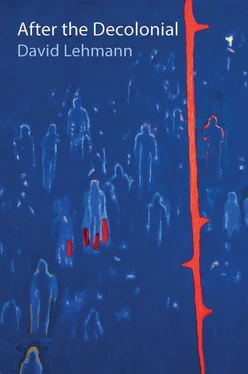These examples are not evidence that universalist concepts of social justice are being implemented via the courts, but they do show that as a result of indigenous mobilizations in Colombia and of the adoption of affirmative action policies in Brazil, universalist criteria of law are being applied to the causes of indigenous or Afro-descendant justice. The road, however, can be rather rocky: judicial involvement in land tenure in Mexico and the implementation of local government in accordance with usos y costumbres in Colombia have not been immune to the influence of organized crime, guerrillas or paramilitaries. The most complete case of confluence of an indigenist rationale and the judicial system that I have found is in the Mexican state of Oaxaca, where the entire electoral system was reformed in the 1990s to allow institutional recognition of usos y costumbres . Yet this has also brought the national and state electoral authorities into an oversight role in which they have intervened to enforce legislation concerning women’s participation and gender parity in elections in the face of persistent chicanery.
Indigenous movements press governments to pass legislation and to make resources available, but it is noticeable that in order to survive and evolve over time – like the CRIC and the Zapatistas – they have to build institutions of their own, and we see how in those processes women come to the fore.
We can see contrasts by comparing the weakness or absence of indigenous movements in Mexico outside Chiapas and in Chile where indigenous claims are mobilized in fragmented ways and have not developed institutionally. The difference arises from a lack of depth which would enable them to extend their activities, in Chile, beyond the ceremonial role of shamans to, for example, governance, education, the law and land tenure. Yet the Chilean Mapuche struggles and the repression inflicted in their region by the government have made their cause emblematic for the nationwide movement to democratize the country’s democracy: in Santiago’s Plaza Dignidad (as it has been popularly re-baptized) the only flag to be seen at regular demonstrations is the Mapuche flag – no party emblems, no national flag – and a Mapuche woman was elected president of the country’s Constitutional Convention in 2021.
The goals of indigenous movements are very often the same as those of other movements, such as those fighting for housing in cities and not least those fighting for human rights. They are in the forefront of causes of universal concern, for example, contesting mining licences in vulnerable environments like the Amazon and the Andean highlands and Guatemala, and resisting illegal mining especially in the Amazon. Conflicts over mining and indigenous rights claims to territorial autonomy and over environmental defence are often one and the same.
This universalism was particular evident in the early days of the Zapatistas. In conjunction with catechists trained by the Archdiocese of San Cristobal de las Casas, they were defending people from different ethno-linguistic groups who had been forced to migrate as a result of the shift to cattle rearing in highland estates where for generations they worked in semi-feudal conditions. Those people were indios but had been living in conditions of servitude rather than in corporate communities, and their leaders were steeped in the rhetoric of liberation theology and secular revolution. They were most certainly victims of racial oppression, and the banner of indigenism served as a rallying cry, as a source of solidarity and importantly as a magnet attracting the sympathy of a certain current of international opinion, but the restoration or protection of indigenous culture formed but one part of their demands. Their movement was inspired principally by a demand for land, for the confirmation of their tenure of land they were already occupying, for socio-economic improvement, and for freedom from repression by the state and landlords. Even before the armed uprising in 1994, they were building institutions, forming cooperatives to manage land they had occupied in the Lacandón forest – but these were not indigenous community institutions.
Evo Morales played this counterpoint between indigenist and other themes like a virtuoso. He cleverly proclaimed the country’s indigenous vocation in terms which made the word ‘indigenous’ itself an ethnic category while downplaying the recognition of numerous ethno-linguistic groups within it. The Constitution drawn up under his auspices recognized formally a long list of nations with their own languages and legal systems, but the recognition remained on paper. He may well have feared the divisive effects of such multiple recognitions, and those whose livelihoods depended on the fragile ecological equilibrium in the Amazonian lowlands were an obstacle to his hydrocarbon-driven neo-developmentalist strategy.
Although this popular-erudite dialectic offers a neat framework, spanning the supernatural and also the world of art, music and culture in general, the epidemiological – indeed pandemic – spread of evangelical Christianity has produced a large and noisy culture area where it does not apply. The same goes for the decolonial, whose reification and exaltation of indigenous culture and knowledge loses some of its credibility in the face of the success of evangelicals among indigenous peoples. For a century, the churches have built cultural worlds where indigenous religious practices, but not indigenous identities or languages, have lost their resonance (save as channels of demonic possession), and where political demands for indigenous rights receive little encouragement. The evangelical, or Pentecostal, faithful, with their rituals of healing and baptism, consummate a rupture with both the Catholic popular culture of fiestas and commemorative processions and the affirmation of class and ethnic difference in carnivals, dance and music, while also rejecting the permissive society and, more recently, departures from traditional forms of marriage and gender roles. The ideal evangelical life requires withdrawal from civic and religious fiestas, at least in principle, renunciation of alcohol and tobacco, and embodies an aspiration to middle-class respectability. In a pattern that invites comparison with social movements, with education and with the professions, women are a driving force in their ranks, though rarely in the leadership. Participation in church life also encourages women to bring about change in their families and to strive for entrepreneurial success.
Evangelical culture seems to stand at the antipodes of what the decolonial might conceive as a politics in its image. Why have a following who could be expected to pursue liberation from colonial oppression, being predominantly drawn from low-income groups and from excluded racial and ethnic populations, joined the churches in such great numbers? How could they have placed their trust in preachers who show no interest in the structures that oppress them or in the racism that excludes them? How can they accept a doctrine that invokes divine authority in teaching self-reliance and legitimizes the neo-liberalism responsible for their oppression? How could it be that Pentecostal churches persuade not only indigenous people who live in the market economy and under the direct authority of modern state apparatuses but also others (in remote highland and lowland tropical environments), who have had but limited contact with states or with the hegemonic languages, to engage in practices that appear to glorify a divinity utterly foreign to their own traditions? How could they retain a predominantly female following while for the most part excluding women from positions of leadership? These questions become even more urgent when we come to neo-Pentecostal churches, with their highly centralized global organizations, their proclamation of material well-being as an end in itself and their disruptive intervention in electoral politics.
Читать дальше












